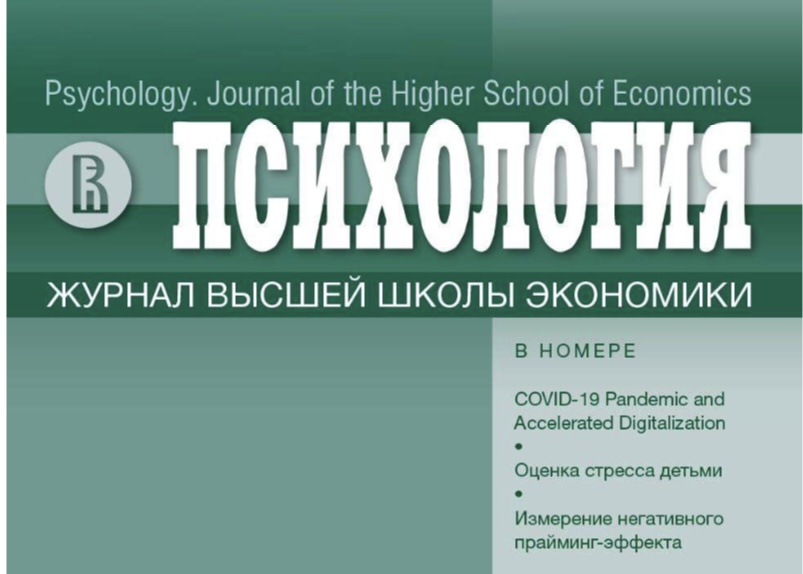Special issue "Socio-Psychological Consequences of Accelerated Digitalization in the Context of the COVID-19 Pandemic," prepared by the staff of the CSCR, was released
The first issue of 2023 included a special issue of "Psychology. Journal of the Higher School of Economics" dedicated to the consequences of digitalization while COVID-19. Articles by CSCR staff N.Tatarko, M.Efremova, D.Dubrov, M.Bultseva, E.Bushina, A.Mironova, G.Rodionov, E.Maklasova, Z.Lepshokova, V.Galyapina based on the results of research conducted within the framework of the Russian Science Foundation project "The Impact of Digitalization on the Social Capital and Values of Russian Society" were published in this issue.

In this special issue readers are treated to a series of articles that, based on empirical research, attempt to understand and, in part, predict the socio-psychological consequences of accelerated digitalization.
The first article by A. Tatarko, E. Bushina, and A. Raevskaya, "How Can Digitalization Accompanying the COVID-19 Pandemic Affect Attitudes towards Political Institutions? The Relationship between Internet Usage Activity and Institutional Trust" examines the relationship between Internet usage activity and institutional trust using representative data from European countries such as Switzerland, Finland, Norway, Denmark, the Netherlands, Croatia, Poland, Serbia, Montenegro, and Bulgaria. The authors found that in countries with low public administration effectiveness, the activity of Internet use was negatively related to institutional trust. The article "Intergenerational Analysis of the Relationship between Involvement in the Internet Space and Institutional Trust among Russians" by A. Mironova considers a problem similar to the one considered in the previous paper, using representative Russian data and with an emphasis on the intergenerational aspect.
M. Bultseva's article "Determinants of the Online Prosocial Behavior during the COVID-19 Pandemic" examines how fears related to the pandemic affect a person's prosocial behavior online. The study found that fear of coronavirus infection and anxiety stimulate prosocial behavior online, while depression inhibits it. A similar problem is addressed in the article "The Relationship between Values and Prosocial Behavior in Different Contexts before and during the COVID-19 Pandemic" (M. Efremova).The growth of digitalization and self-isolation, which was a consequence of the COVID-19 pandemic, served as a rather powerful impetus for the development of online education. The article "Relationship between Individual Values and Involvement in Online Learning: The Role of Social Capital" by G. Rodionov and E. Maklasova presents the results of the research on the relationship between values and involvement in online learning and the role of social capital in this connection. The results show that engagement in online learning correlates with social capital and values.
One of the research papers in this special issue, "The Relationship between Involvement in the Use of Information and Communication Technologies and Family Social Capital" (D. Dubrov), explores the relationship between information and communication technology engagement and intra-family social capital. One hundred and four families (parents and adolescents, a total of 208 people) participated in the study.
A study by V. Galyapina and I. Molodikova, "Russians' Involvement in Information and Communication Technology Using and Intercultural Attitudes: The Role of On-Line Intra- and Inter-Ethnic friendships" attempted to answer the question of how digitalization, which has increased as a result of COVID-19, can be related to interethnic mutual perception and relationships? This paper sought connections between the intensity of information and communication technology use and intercultural friendships and people's intercultural attitudes. The Internet facilitates both intercultural interaction itself and the maintenance of intercultural friendships, but it appeared that the direct influence of the Internet on intercultural attitudes was not very significant. The influence of the Internet on intercultural attitudes becomes significant when one considers intercultural friendships as a mediating variable.
A special issue concludes with a study on the relationship between Internet and social networking activity and ethnic discrimination on the networks. "Online Ethnic Discrimination and Self-Esteem of Ethnic Majority: The Mediating Role of Ethnic Online Orientation" by Z. Lepshokova shows that experiences of ethnic discrimination can have negative consequences in both real and virtual spaces.

